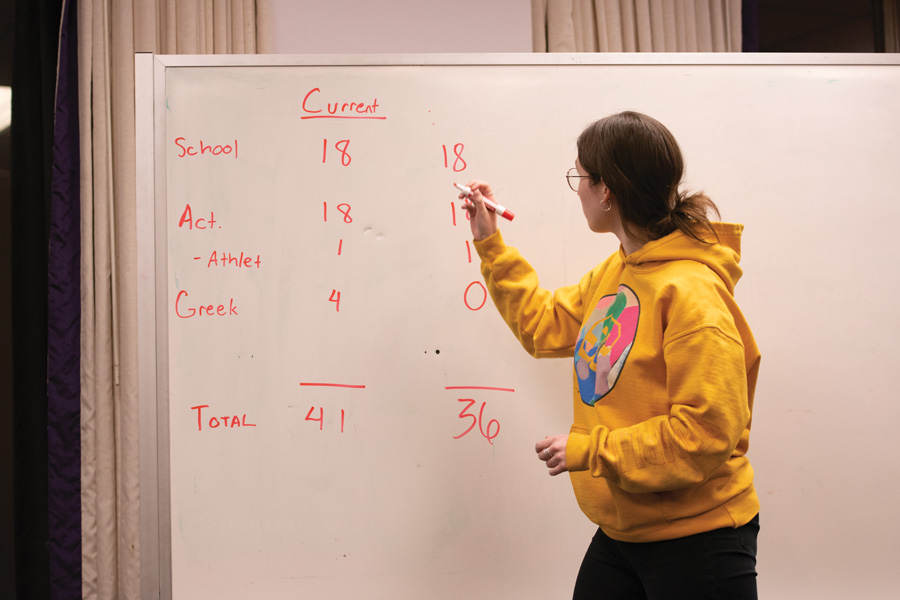ASG’s Policy Research Institute: researching peer institutions to solve NU problems
Daily file photo by Yunkyo Kim
Policy Research Institute Chair Margot Bartol at a previous ASG meeting. The Institute, ASG’s newest committee, will oversee research for ASG’s long-term, inter-committee projects.
October 4, 2020
For Associated Student Government, turning ideas into policy takes research.
Much of Fall Quarter is spent on research because each ASG committee’s ideas need to be investigated thoroughly before being pitched to Northwestern administrators. But this year, a new committee entirely dedicated to research is coming to ASG — the Policy Research Institute.
The Institute was chartered in the spring, but the idea of having a designated body for research has been floating around ASG over the last year, Margot Bartol, chair of the Policy Research Institute, said.
“What the committee is tasked with doing is researching the complex, long-term initiatives that ASG has that kind of overarch any one particular committee,” Bartol said.
The Weinberg junior said for each issue, the committee will pay attention to who is impacted, what NU has done in the past and what peer institutions are doing, as well as coordinating efforts between ASG committees. The Institute will have the ability to view projects at a macro level, Bartol said.
Weinberg junior and ASG Chief of Staff Elizabeth Sperti said because of the amount of research involved in ASG projects, the new committee is necessary to “streamline the information process” so an overwhelming amount of research isn’t falling on individual committee members.
“Having an entire committee dedicated to this kind of work probably not only means that the quality of our research will be better, but I am hoping that it will also be presented more clearly,” Sperti said. “Not only informing the student body more effectively, but more effectively convincing administrators, which in turn, affects everybody.”
An important part of the committee’s work is identifying how NU ranks among peer institutions in certain areas, and looking at what systems are in place at those colleges and universities that are helping them succeed. Plus, Bartol said, NU administrators want to be aware of what’s working at other schools.
“It’s a lot easier to convince someone to do something if they’ve seen that it’s already worked,” Bartol said. “Administrators are going to be much more likely to be open to an idea if a more prestigious or similarly prestigious institution had done it.”
The Institute, still in its first year, only has a few members, and Bartol is in the process of onboarding more as ASG goes through recruitment. Nevertheless, the Institute has already been involved in ASG projects.
Bartol worked over the summer comparing university financial aid offices, looking at how they function generally and in the context of COVID-19. During her research, Bartol found that while NU’s emergency COVID financial aid fund is “incredibly opaque,” it is “not doing as poorly” as some of its peer institutions.
“I don’t want to say ‘we do better’ because I don’t know if what we do is a better system. But it gives you some perspective on the other systems that could be there and could be so much more frustrating,” Bartol said. “There are schools who are miles above us, but there are few of them.”
Weinberg senior and ASG President Juan Zuniga said he’s excited for the potential projects that might come out of the Institute, and what it could mean for ASG going forward. He mentioned possibilities in projects surrounding financial aid and student mental health services.
“This is the first year we’re doing something like this. I think it’ll be really cool because people always talk about, ‘What if we did more research in comparison to other schools?’” Zuniga said. “It makes it a really good case for Northwestern to start shifting towards something that will help students.”
Clarification: This story has been updated to correct a source’s comment about a University financial aid fund.
Email: emilysakai2023@u.northwestern.edu
Twitter: @em_sakai
Related stories:
— ASG’s COVID-19 task force deals with “fallout” of University decisions
— ASG president Katherine Conte steps down, VP Juan Zuniga succeeds



